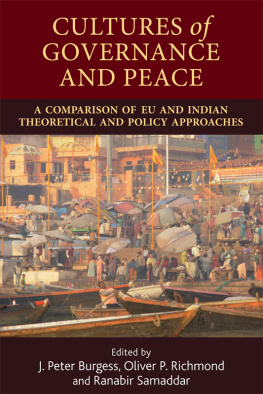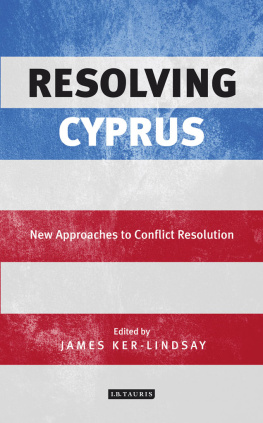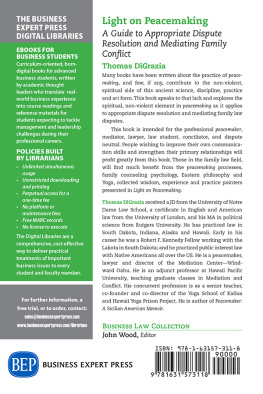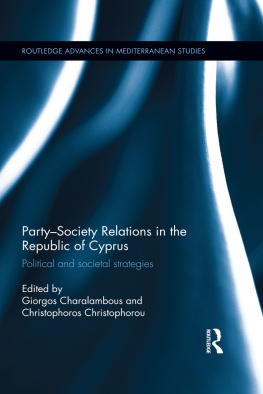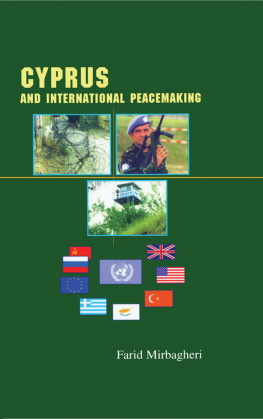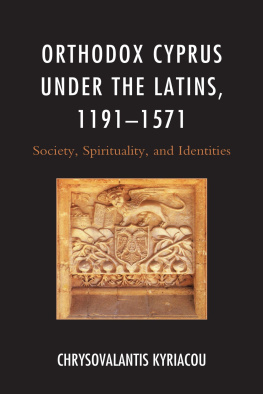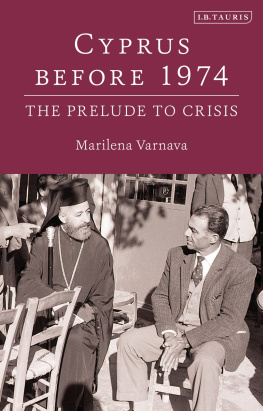MEDIATING IN CYPRUS
THE CASS SERIES ON PEACEKEEPING
ISSN 1367-9880
General Editor: Michael Pugh
This series examines all aspects of peacekeeping, from the political, operational and legal dimensions to the developmental and humanitarian issues that must be dealt with by all those involved with peacekeeping in the world today.
- Beyond the Emergency: Development within UN Peace Missions
edited by Jeremy Ginifer - The UN, Peace and Force
edited by Michael Pugh - Mediating in Cyprus: The Cypriot Communities and the United Nations
by Oliver P. Richmond - Peacekeeping and the UN Specialized Agencies
edited by Jim Whitman
Mediating in Cyprus
The Cypriot Communities and
the United Nations
OLIVER P. RICHMOND
First Published in 1998 in Great Britain by
FRANK CASS PUBLISHERS
2 Park Square, Milton Park, Abingdon, Oxon, OX14 4RN
and in the United States of America by
FRANK CASS PUBLISHERS
270 Madison Ave, New York NY 10016
Transferred to Digital Printing 2006
Website http://www.frankcass.com
Copyright 1998 Oliver P. Richmond
British Library Cataloguing in Publication Data:
Richmond, Oliver P.
Mediating in Cyprus: the Cypriot communities and the
United Nations. - (Cass series on peacekeeping; no. 3)
1. United Nations 2. Conflict management Cyprus 3. Conflict
management Cyprus History
I. Title
327. 1'7'095693
ISBN 07l464877 9 (cloth)
ISBN 071464431 5 (paper)
ISSN 1367 9880
Library of Congress Cataloging-in-Publication Data:
Richmond, Oliver P.
Mediating in Cyprus: the Cypriot communities and the United
Nations / Oliver P. Richmond.
p. cm. - (Cass series on peacekeeping, ISSN 1367-9880; no. 3)
Includes bibliographical references and index.
ISBN 0-7146-4877-9 (cloth). - ISBN 0-7146-4431-5 (pbk.)
1. United NationsCyprus. 2. Mediation, International.
3. CyprusHistoryCyprus Crisis, 1963. I. Title. II. Series.
JZ4997.5.C93R53 1998
341. 23'5693-dc21
98-11818
CIP
All rights reserved. No part of this publication may be reproduced, stored in or introduced into a retrieval system, or transmitted, in any form or by any means, electronic, mechanical, photocopying, recording or otherwise without the prior written permission of the publisher of this book.
Typeset by Regent Typesetting, London
Contents
Acknowledgements
This book has benefited from a wide range of input, from friends, colleagues, and many other writers, most of who are named in the bibliography. Professor AJR Groom, Dr Keith Webb, Dr Andy Williams at the University of Kent, and Dr Stephan Ryan at Magee College, University of Ulster, have also contributed to the formulation and development of this work. I also owe a great deal to all those anonymous authors of the many official documents I have consulted. I would also like to thank all those in Cyprus, on both sides of the ignominious greenline, and those who are working on related issues who have contributed their time, ideas, information and comments, whether intentionally or not. All errors are, of course, my own responsibility.
Not least, I would like to thank Myria for her contributions and support throughout the long and often tortuous process of piecing this book together.
Preface
This book continues a long line of studies, some far more notable than others, which have been carried out on aspects of the Cyprus problem since the 1960s. Much has been written on the issues related to the Cyprus problem and many different points of view have been presented. Indeed, there exists around the analysis of the Cyprus problem a whole culture of debate and discussion of varying quality, and with varying agendas, ranging from the coffeeshop and the armchair strategists of the island itself to the diplomatic and academic debate of insiders and outsiders who endeavour to comprehend this Byzantine or Ottoman maze. A massive amount of effort has been put into the analysis of the Cyprus issue, question or problem. It is perhaps the geopolitical nature of Cyprus that it is subject to so many conflicting and perhaps irreconcilable interests, from the communal to the regional and the international level. Throughout its history Cyprus has been subject to the whim of others, and its people have been buffeted by the tides of occupation which have necessarily swept the eastern Mediterranean. Furthermore, the heritage of Greek and Turkish Cypriots has been that theirs are dependent cultures. Unless these local and regional trends are resolved this will not be that last book written on the Cyprus problem. Thus, what I have tried to do is to move the discussion of why there has not been a solution to the Cyprus problem along to a point where what I feel is one of its most significant obstacles, can be identified and acted upon.
This book is about the efforts of the people on the island to find their feet in the Cold War and postCold War world of sovereign states, and about their feud over who would hold the reins of power on the island, and which regional set of interests would prevail. The UN peacemaking operation in Cyprus has been one of the longest of its kind, and has been aimed at aiding the two parties to escape the dilemmas such debates entail. Yet it has resulted in little but discarded proposals, nonpapers or reports. Most analyses of efforts to resolve the Cyprus problem, and indeed most other conflicts, have tended to concentrate on the process of mediation andnegotiation from the outside in, regarding the two sides as being unable to advance without effective assistance from a third party and presupposing that the parties were sincere in their professed objective of a compromise, which underlies all mediation efforts. Yet this does not explain why both parties seemed more satisfied with the status quo than with the types of solution that have evolved through the UN peacemaking operation.
The oftenquoted comment once made about the probable headline in one of the island's many newspapers, the Cyprus Mail, in the event of a third World War does seem singularly apt: 'Third World War Delays Consideration of the Cyprus Problem'. Cyprus does provide a microcosm of the many problems that afflict the wider world and peacemaking in general, although as an isolated problem it is of relative insignificance. Nevertheless, to those who are directly involved it seems to challenge the international system and thus to be of great significance to all. To a certain extent this is true; the essence of the problem falls into the grey area of international norms, touching as it does on problems of majority versus minority, regional preponderance, sovereignty, legality, ethnicity, statehood and secession, which the international system has itself been grappling with since the formation of the UN. But what it illustrates among other things is that such problems should not be left to fester unassuaged, otherwise their potential to grow into a much greater significance will remain indefinitely. The failure of the parties to the Cyprus problem to agree has created the threat of a regional war on many occasions, and continues to do so.


